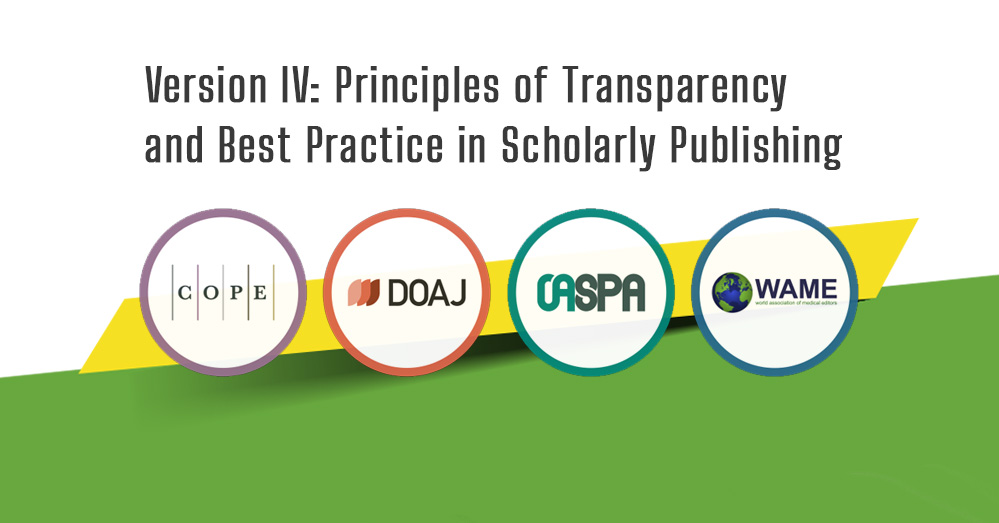Recently Committee on Publication Ethics (COPE), the Directory of Open Access Journals (DOAJ), the Open Access Scholarly Publishing Association (OASPA), and the World Association of Medical Editors (WAME) have collaborated in curating the 4th version of the principles of transparency and best practice in scholarly publishing.
According to the new guidelines, all published content, including special issues and conference proceedings, should adhere to these Principles. A journal’s procedures must be transparently communicated if they differ from those outlined.
The publication should also promote accessibility, diversity, equity, and inclusivity. The decision to publish should be based on scholarly merit. It should not matter where the manuscript originates, including the authors’ nationality, ethnicity, politics, race, or religion. Managing policies for inclusivity should be a regular part of the journal’s operations to ensure none create an exclusionary environment.
There are four major areas that these principles cover, that is, journal content, practices, organization, and business practices. These tenets form the bases on which principles of transparency and best practices for scholarly publications are assessed by COPE, DOAJ, WAME, and OASPA for membership suitability. Additionally, each organization has its own criteria for evaluating applications. Those who failed to demonstrate transparency and best practices will not be included in the list of member journals.
These guiding principles serve as a foundation for best practices and help existing and new journals reach the highest standards possible. It provides guidance on how to make information available on websites, peer review, access, author fees, and publication ethics. Additionally, these principles cover ownership and management, copyright, and licensing, as well as editorial standards.
Considering the changes in scholarly publishing landscapes since the last update of these guidelines in 2018; Four organizations have collaborated on the fourth edition of the principles in order to align them with today’s scholarly publishing environment.
According to Margaret Winker, MD, WAME Trustee; The new version includes more information about peer review practices, publication ethics policies, and author fees to achieve journal transparency. This version emphasizes practices that are achievable by journals regardless of their resources, just as previous versions did. A thorough reorganization has been made to make this version easier to use. It emphasizes the need for inclusivity in scholarly publishing and emphasizes the importance of editorial decisions based on merit and not on the author’s nationality, political beliefs, or religion.
About COPE: COPE provides educational and support services to editors, publishers, universities, research institutes, and others involved in publication ethics. In essence, it seeks to change the publishing culture so that ethical practices are accepted as normal.
About DOAJ: DOAJ is a community-curated online directory that indexes and provides access to high-quality, open-access, peer-reviewed journals.
About OASPA: OASPA is a diverse community of organizations engaged in open scholarship. They work to encourage and enable open access as the predominant model of communication for scholarly outputs.
About WAME: WAME is a global nonprofit voluntary association of editors of peer-reviewed medical journals who aim to foster cooperation and communication among editors; enhance editorial standards; promote professionalism in medical editing through education, self-criticism, and self-regulation; and promote research on medical editing principles and practices.

COMMENTS
Thanks,for this information
Very interesting and excellent work.
Thanks
Good…
The level and deep of research and works that must be accepted by the journals and the review process must be transparent and constructive, inviting the author to the improvement and involve many elements and resources in research.
Thank you
Thank you for the current information.
Kind regards
Chernet Assefa
In addition, theme of each journal must be highlighted for quick appreciations.
I am interested in publishing my scientific product and my team in good scientific Journals. The problem is the high publication fees and those from low-income countries cannot afford the required fees. Mostly we are keen to publish original work, but barriers are much more than could be expected. Some journals including those with high rate impact do not accept articles with no charging fees, while others, yes consider those authors from LMIC, but at the same time, they delay in replying, and after a long time of waiting they easily send you an email saying “we regret to publish your work”. So do we consider these conduct when we need to discuss the quality of publishing agencies and the quality of conduct by these journals?
We need to answer many questions in this regard, however, the space is insufficient to mention them in this corner.
A fine piece of contribution toward justifiable decision-making in the academic publishing business. Good work.
Formidable! Very interesting and useful information just when we were preparing for the COPE and DOAJ evaluations!
Good work…….
Muy buena filosofía y concepción de trabajo
Good information
very good
fantastic and wonderful
Very good
This information is useful for those who are involved in journal publishing especially in local journal.
Thnaks for this.
Really, it is interesting and good work. Keep it up!
With best regards,
Dereje Dobocha
A good vision